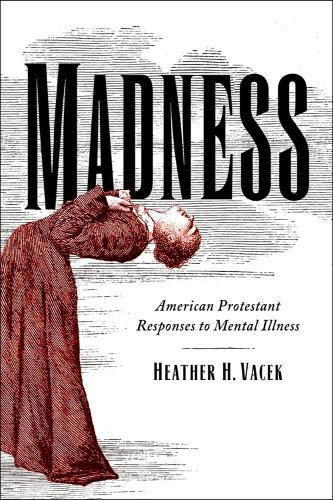Full Product Details
Author: Heather H. Vacek
Publisher: Baylor University Press
Imprint: Baylor University Press
Dimensions:
Width: 15.20cm
, Height: 2.10cm
, Length: 22.90cm
Weight: 0.272kg
ISBN: 9781481300582
ISBN 10: 148130058
Pages: 277
Publication Date: 31 August 2023
Audience:
Professional and scholarly
,
Professional & Vocational
Format: Paperback
Publisher's Status: Active
Availability: Manufactured on demand

We will order this item for you from a manufactured on demand supplier.
Reviews
"Madness is a fine accomplishment, weaving together a theological point with historical analysis. --Sean Cosgrove ""Journal of Religious History"" ... Madness is a fascinating read and of particular interest to historians, mental healthcare practitioners, and those researching the intersection between medicine and religion. --E. Janet Warren ""Perspectives on Science and Christian Faith"" A text that will be read profitably both within the academic community and outside it. --Jeremy Bonner ""Journal of Ecclesiastical History"" I recommend this book, and especially its final chapter, to pastors and church leaders who are seeking to reflect on and develop a congregation's ministry among people with mental illnesses, whether they be church members or strangers. It will also appeal to readers with an interest in the history of American mental health attitudes and practices, or, more generally, the history of Christian influences on American society. --Christine Guth ""Anabaptist Disabilities Network"" In sum, Vacek combines top-notch historical inquiry with a concern for effective theological responses to mental suffering. She carefully contextualizes the lives of her subjects in relation to broad religious and medical trends, and her in-depth biographical studies facilitate insightful, comparative analysis. The book is accessible to a broad audience and represents an excellent addition to the growing scholarly literature addressing the intersection of religion, medicine, and healing. --Joseph Williams ""Journal of the History of Medicine and Allied Sciences"" This timely and deeply moving study has garnered wide media attention. It shows how American Protestants have addressed and, more often, failed to address mental illness in their congregations. -- ""The Christian Century"" Vacek has written a scholarly jeremiad in which she has weighed her co-religionists' responses to mental illness in the moral balance and found them wanting. The organization of the book highlights what she persuasively argues is a perennial gap between belief and practice in her faith community...The prose is clear, the documentation thorough, and her stance heartfelt. --Lawrence B. Goodheart ""Bulletin of the History of Medicine"" Vacek has written an important text for professors of pastoral counseling/clinical pastoral education and students in divinity and theological schools to disentangle church history and understand what it is they believe about the role of churches and clergy in the accompaniment of people with mental disabilities. --Corrine C. Bertram ""H-Net Reviews in the Humanities & Social Sciences"" Vacek's book serves as an important reminder of how conceptions of mental illness and the structure of care for the mentally ill has a long and complicated history, shaped by everything from religious reformers, the emerging field of professionalized medicine, and the evolution of often grossly underfunded state institutions. --David Eagle ""Sociology of Religion"" We live in an era of ever more interest in religion and medicine, yet religious studies has produced remarkably few monographs on the relationship between religion and mental health. The historical breadth of Vacek's book offers a wide-angle lens on this relationship, tracing major shifts as well as detailing turns both disturbing and promising. Aware both of the importance of history and the variety of communities such studies might reach, Vacek offers a thoughtful starting point for future scholarship and engagement. --Philippa Koch ""The Journal of Religion"""
Author Information
Heather H. Vacek is Vice President, Dean, and Associate Professor of Church History at Moravian Theological Seminary and Lancaster Theological Seminary.




